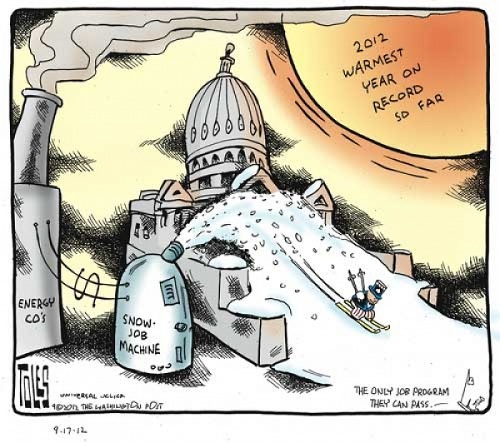2012 SkS Weekly Digest #40
Posted on 8 October 2012 by John Hartz
SkS Highlights
Dana's The Economic Damage of Climate Denial examines yet another in a long line of economic analyses of the costs and benefits of using carbon pricing as a mechanism to stabilize and reduce harmful emissions. In Modelling the permafrost carbon feedback, Andy S discusses a recent modelling experiment showing that climate change feedbacks from thawing permafrost are likely to increase global temperatures by one-quarter to a full degree Celsius by the end of this century.
SkS Toon of the Week

What say you?
What spoonfuls of sugar do we have in our arsenal that might enable the average person to swallow the "medicine" of climate change mitigation and adaption? As we all know, the average person is not exactly breaking down any doors to get this medicine.
Take Action Alert
Please sign this petition to support the continuation of the British Antarctic Survey as an indepent agency.
The British Antarctic Survey is a world-leading research organisation with an unparalleled international reputation for polar science. Its research has over five decades led to many world-changing discoveries, including the ‘hole’ in the Earth’s protective ozone layer. Today its scientists are conducting vital work to try to understand the unique environments of the Arctic and Antarctic, particularly the very rapid climatic changes occurring at the poles. The proposed merger would undermine the work of polar scientists and diminish Britain’s national presence in the polar regions.
Quote of the Week
"Research by Grant Foster of the United States and Stefan Rahmstorf of Germany has shown that recent variations in the solar cycle, volcanic activity and El Niño/La Niña events actually had a tempering effect on warming. Similarly, Markus Huber and Reto Knutti of the Institute for Atmospheric and Climate Science in Zurich found by using simulation models that non-greenhouse gas factors could have accounted for only about 1% of the warming experienced since 1950. And this summer a team headed by Peter Gleckler of Lawrence Livermore National Laboratory provided strong evidence that the recent warming of the ocean surface could be traced to human activities. The evidence is now overwhelming that by and large the warming we are seeing has an anthropogenic cause." - Glen M. McDonald*
Source: Climate-change denial getting harder to defend, Op-ed by Glen M. McDonald, Los Angeles Times, Oct 4, 2012
*Glen M. MacDonald chairs UCLA's Institute of the Environment and Sustainability and is a professor of geography and of ecology and evolutionary biology.
The Week in Review
- 2012 SkS Weekly News Round-Up #4 by John Hartz
- Skeptical Science Android App update by John Cook
- Arctic Sea Ice Loss Has a Larger Impact than Antarctic Sea Ice Gains by Tamino
- Nate Silver's Climate Chapter and What We Can Learn From It by Dana
- Modelling the permafrost carbon feedback by Andy S
- The Economic Damage of Climate Denial by Dana
- New research from last week 39/2012 by Ari Jokimäki
- 93% of Fox News climate change coverage misleading by John Cook
Coming Soon
- New research from last week 40/2012 (Ari Jokimäki)
- Lessons from Past Climate Predictions: Arctic Sea Ice Extent 2012 Update (Dana)
- Update from Easton Glacier: Climate Crocks on Ice (greenman3610)
- Jerry Mitrovica: Current Sea Level Rise is Anomalous. We've Seen Nothing Like it for the Last 10,000 Year (Rob Painting)
- How Much of a Role Did the Arctic Storm Play in the Record Sea Ice Minimum? (Dana and Albatross)
- Vanishing Arctic Sea Ice: Going Up the Down Escalator, 2012 Update (Dana)
- Most coral reefs are at risk unless climate change is drastically limited (John Hartz)
- 2012 SkS News Roundup #4 (John Hartz)
- Fred Singer - not an American Thinker (John Abraham and Dana)
SkS in the News
Andy's Modelling the permafrost carbon feedback was re-posted on Climate Progress.
John Cook's 93% of Fox News climate change coverage misleading was published at The Conversation and SBS World News.
John Cook's Indicators of a Warming World graphic was featured on The Huffington Post.
John Hartz's 2012 SkS Weekly Digest #39 was re-posted at Environmental Guru.
10 SkS myth rebuttals have been featured at Chasing Ice, as noted by Heather Conn Blogs.
SkS Spotlights
The International Arctic Research Center (IARC) at the University of Alaska Fairbanks (UAF) was established in 1999 as a cooperative research institute supported by both the U.S. and Japanese governments. Funding comes from the National Science Foundation and the National Oceanic and Atmospheric Administration in the U.S. and from the Japan Agency for Marine-Earth Science and Technology, and Japan Aerospace Exploration Agency. More than 20 international groups and more than 60 scientists are collaborating with IARC, allowing the institute to meet our mission and goals through shared understanding and cooperation. Read more on our History page.































 Arguments
Arguments























 0
0  0
0






Comments